Pittsburgh summers can be hot and humid – especially in July and August. Air conditioners are essential in all homes. If your unit breaks down on a particularly hot and humid day, you could be in for a very uncomfortable experience. Calfo Home Services has created this guide to inform you of the basics that will help you understand what to do when your air conditioner is acting up or malfunctioning.
Understanding and Maintaining Your Air Conditioner in Pittsburgh, PA
Understanding how your AC system works is essential before attempting any repairs. Provided below are the various components and functions of typical air conditioning systems found in Pittsburgh homes.
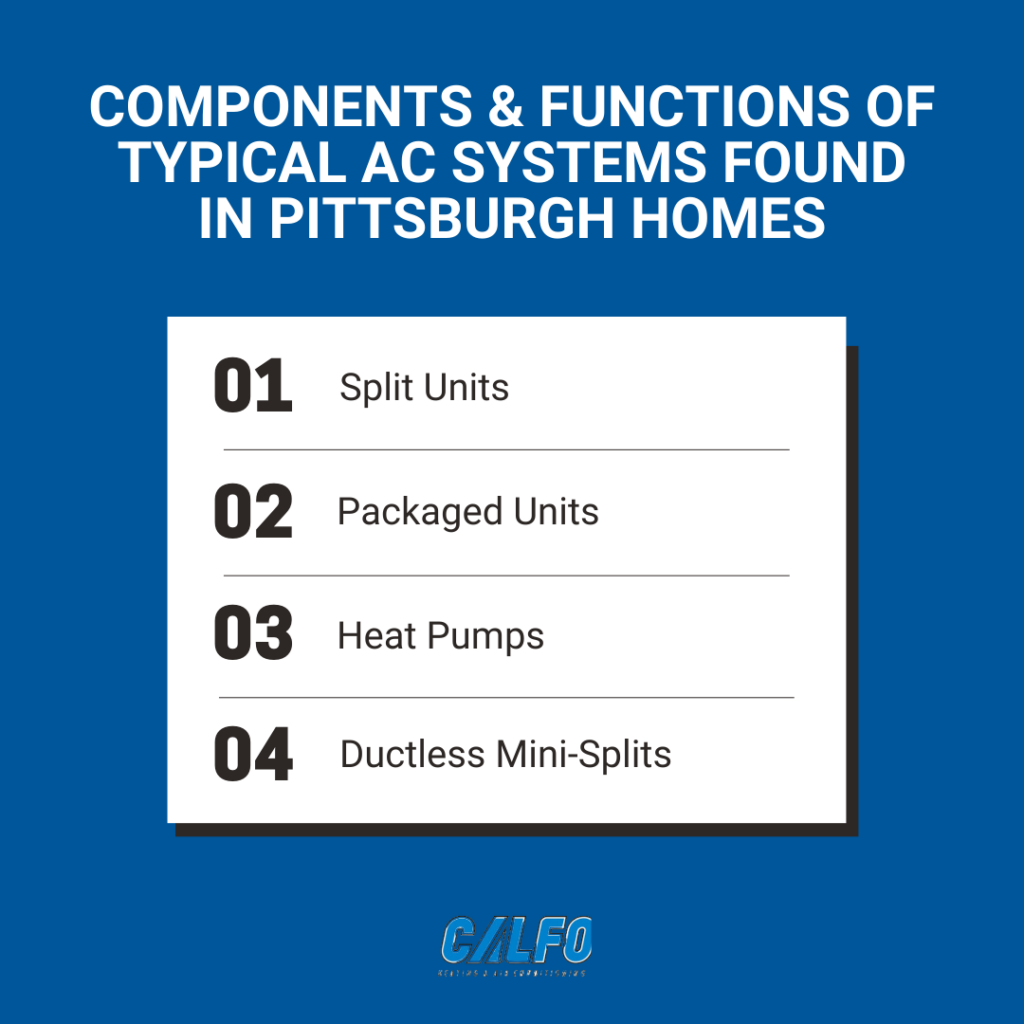
The most widely used types of air conditioning units are split units and packaged units. They can briefly be described based on a few simple differences.
Split Units – these units feature two components – the condenser on the outside of your home along with the evaporator coils somewhere on the inside of your home.
Packaged Units – this unit contains a condenser and evaporator coil that have been built together (typically placed in the attic of the home).
Heat Pumps – heat pumps are becoming an increasingly popular all-in-one heater and air conditioner solution. A heat pump can come in either split or packaged unit format.
Ductless Mini-Splits – ductless mini-splits are also gaining popularity nationwide, particularly in areas where there is no existing duct system, such as basements. Not only do manufacturers design them to be functional, but they also make them aesthetically pleasing, resembling household decorations rather than traditional window units.
DIY AC Repair Tips & Tricks
When facing an issue with your air conditioning unit, it is important to remember that not all problems require the assistance of a professional technician. Instead, you can easily explore a range of do-it-yourself (DIY) repair tips that are both simple and safe. By following these steps, you can effectively address minor AC issues from the comfort of your own home.
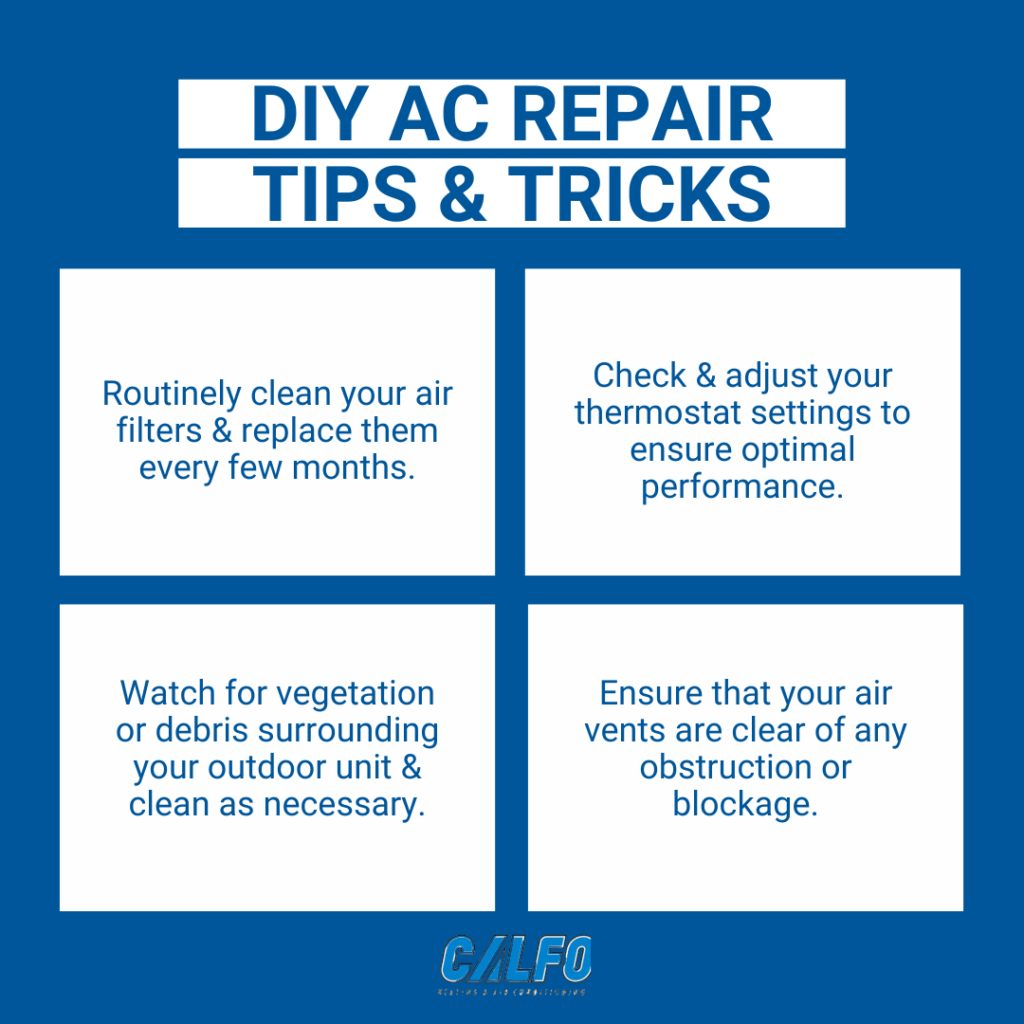
DIY AC Repair Frequently Asked Questions (FAQ)
When starting DIY projects, you may have a lot of questions about the equipment you are working with, and those questions can lead to more questions. Luckily, trained professionals at Calfo Home Services are here to help! We have crafted a list of some of the most common DIY FAQs, to help you with your next HVAC DIY project.
- Is there a reset button on my AC Unit?
Most AC units have a reset button on the exterior of the condenser unit. Look for a large red button outside your house. If you can’t find it, it may be inside the condenser behind the service panel. Remember to shut down the system before looking inside the condenser.
- How often should I change my AC filter?
It is generally recommended to change your AC filters every 1-3 months, depending on the type of filter and level of usage.
- What should I do if my AC unit is leaking water?
Check for clogged or disconnected drain lines, frozen evaporator coils, or a dirty air filter that may be causing the issue.
- What can I do if my AC is not turning on?
Check the thermostat setting, inspect circuit breakers, and ensure that the unit is receiving power by inspecting the wiring for any visible issues.
- How do I know if my thermostat is the problem?
If your AC isn’t responding to thermostat settings, try replacing the batteries, checking the settings, or replacing the thermostat altogether.
Understanding these common questions and their answers can help you troubleshoot and maintain your air conditioning system effectively. However, always prioritize safety and consult a professional for more complex AC issues.
Cleaning Your Home AC Unit
Cleaning your home air conditioner may not be a top priority until you receive a reminder email or postcard for servicing. While it’s always a good idea to have your AC professionally serviced annually, you can save yourself money by doing some of the cleaning yourself. When cleaning your air conditioner, the focus is usually on the outdoor component, known as the condenser. Here are some basic tips for DIY AC cleaning:
- Clear away/clean leaves and debris from the unit using a rake or vacuum.
- Unscrew the fan and thoroughly clean the area with a cloth or cleaning solution.
- Give the fins a gentle spray with a mild-pressure washer or hose.
- Once cleaning is complete, re-install the fan and secure it carefully.
By following these simple steps, you can ensure your AC stays in top condition while saving on maintenance costs.
Proactive AC Care: The Importance of Preventative Maintenance
The best way to avoid the common issues of dealing with an HVAC company is to be well-prepared. Scheduling regular maintenance and air conditioning repairs in advance can save you both time and money. Homeowners anticipating that their air conditioner or furnace may not last the upcoming season should consider replacement now to ensure they get the system they want within the necessary timeframe. Prevention is better than cure. Discover regular maintenance practices that can help you avoid frequent repairs and extend the life of your AC unit.
Air Filter Replacement: Why It’s Critical
Dirty or clogged air filters are often the biggest contributor to HVAC system malfunction or failure. They can cause your heater and AC unit to work overtime to compensate for proper airflow, which will generally result in a noticeable spike in your monthly utility bill.
Dirty air filters can worsen respiratory issues like asthma and allergies. Over time, air filters trap and collect dust, pollen, debris, and even mold. If you haven’t changed the filter in a while, these contaminants can circulate throughout your home, spreading irritating allergens. This is especially problematic in dry climates and homes with pets, where dirty air filters significantly impact indoor air quality.
The best way to prevent issues related to dirty air filters is to set basic reminders on when to change your air filter. Air filter cleaning or replacement should take place every 1-3 months depending on the type of filter and home HVAC system usage.
Essential Tips for Seasonal AC Maintenance
In a city like Pittsburgh that experiences seasonality, seasonal maintenance is critical for maintaining a comfortable home environment. Your HVAC system is not only responsible for keeping your home at a comfortable temperature year-round, but it is also a major expense. From monthly utility bills to potential air conditioning repairs or replacements, your HVAC system can greatly impact your budget.
However, with a little DIY maintenance, you can extend the lifespan of your HVAC system and improve its efficiency, ultimately saving you time and money.
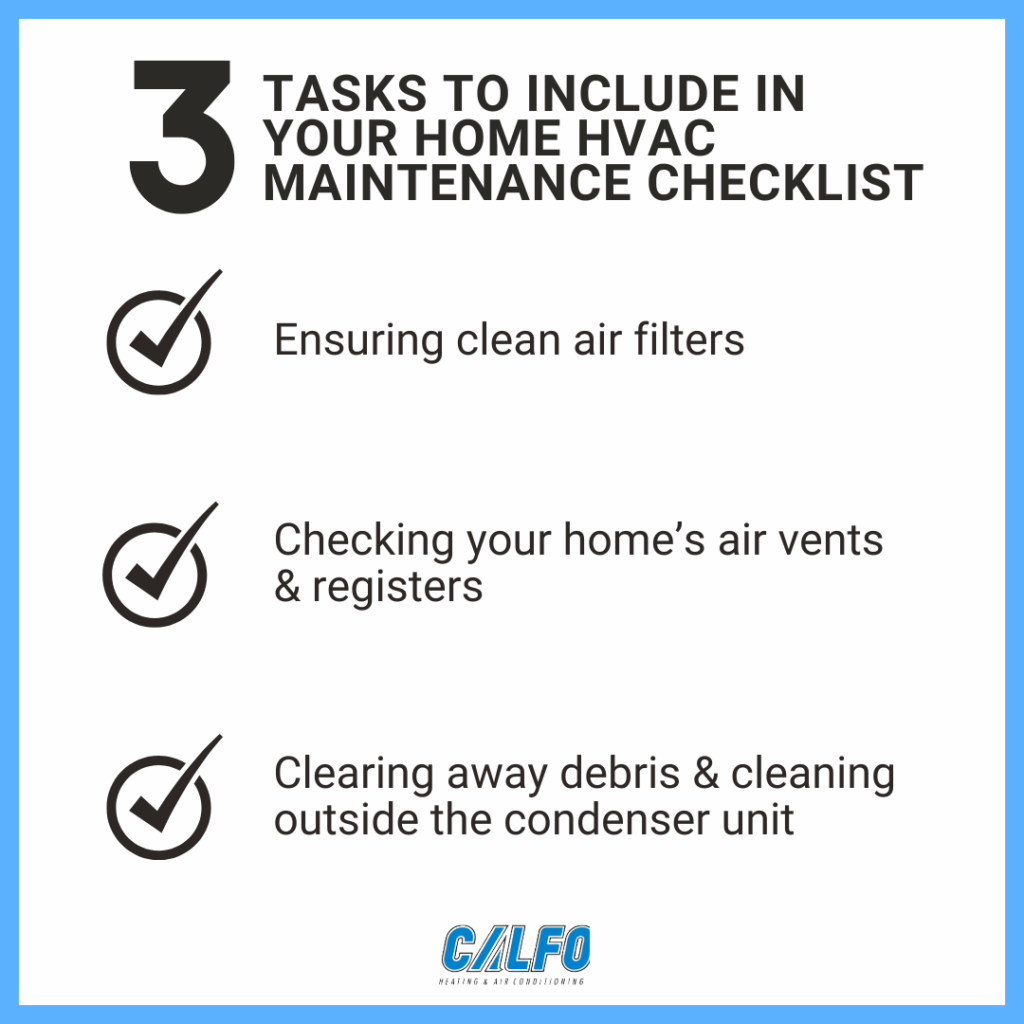
Air Conditioner Energy Efficiency Tips for Pittsburgh Homeowners
Electric VS. Gas Powered Air Conditioners
The affordability of gas vs electric-powered AC units can vary based on several factors, including initial purchase costs, installation expenses, and ongoing maintenance expenses.
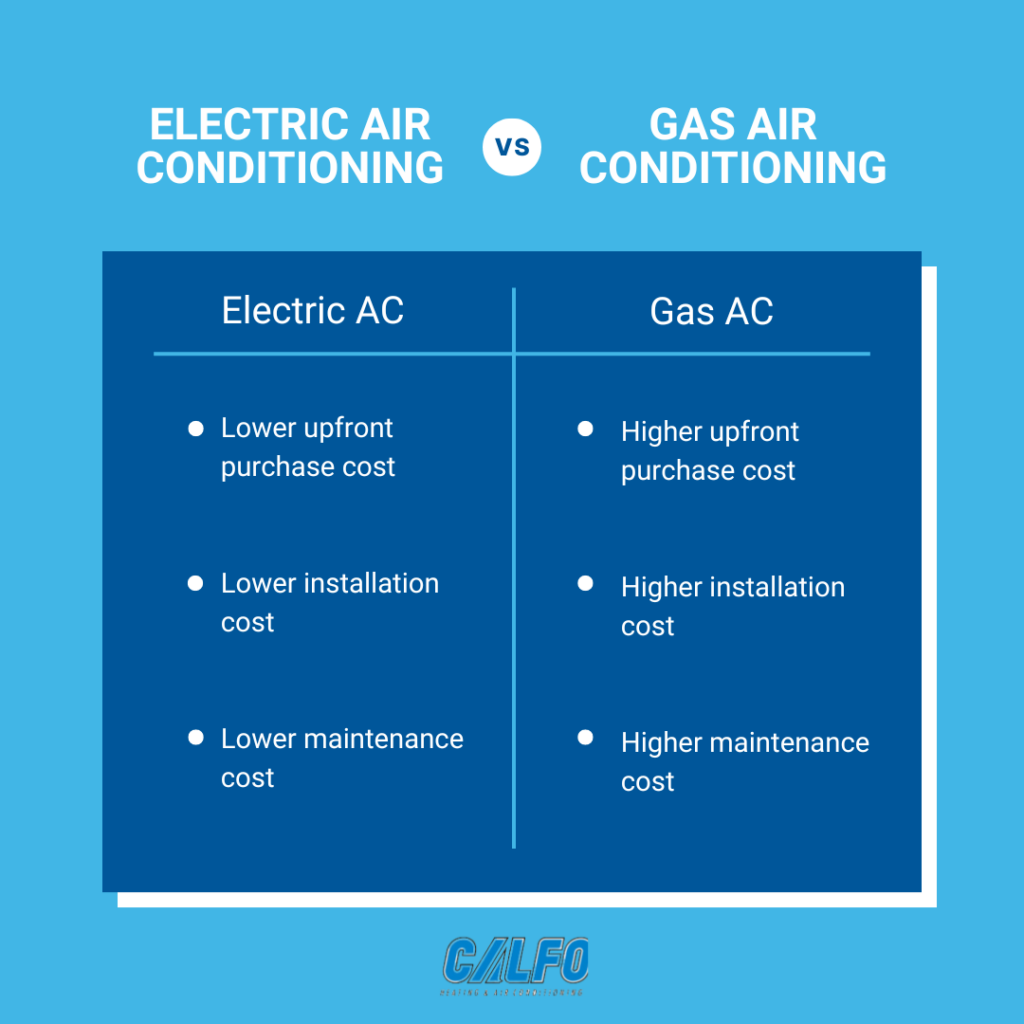
Let’s break down each aspect and what they mean for Pittsburgh residents:
1. Purchase Costs: Generally, electric-powered AC units tend to have lower upfront costs compared to gas-powered units. Electric units are typically more widely available and have simpler designs, which can lead to lower purchase prices. Gas-powered units often involve additional components like gas lines, which can increase initial costs.
2. Installation Expenses: Installation costs can depend on factors such as the type of unit, existing infrastructure (like gas lines), and labor costs in your area. In Pittsburgh, PA, installation costs for gas-powered units might be higher due to the need for gas line installation or modifications. Electric units may have simpler installation requirements, potentially making installation costs lower.
3. Maintenance Costs: Maintenance costs can vary depending on the type of unit and any specific maintenance requirements. Gas-powered units may require regular inspections of gas lines and combustion components, which could lead to higher maintenance costs over time. Electric units may have fewer components to maintain, potentially reducing maintenance expenses.
Considering these factors, electric-powered AC units might generally be more affordable to purchase, install, and maintain in Pittsburgh, PA, especially if gas line installation or modifications are required for gas-powered units. However, it’s essential to consider energy efficiency and operating costs over the long term, as these can also impact overall affordability. Additionally, consulting with local HVAC professionals can provide more accurate cost estimates based on your specific circumstances and needs.
Electricity Consumption of Central AC Units
Central AC units use energy for two things: cooling air and circulating air. What determines the energy consumption of a central AC unit? A few things:
- Size: the larger the unit, the more energy will be used.
- Efficiency rating: The higher the efficiency rating, the less energy the unit uses to cool and circulate the air.
- Climate: Climate can determine how often you are using the unit, and how hard the unit must work to make warm/hot air cool.
- Insulation: The better insulated your home is, the better it will keep the cool air in your home and keep the warm air outside from making its way inside.
Innovative Air Conditioning Technologies for Pittsburgh Homes
As technology progresses, the less energy is needed to power AC units, the longer they last, and the easier they are to operate.
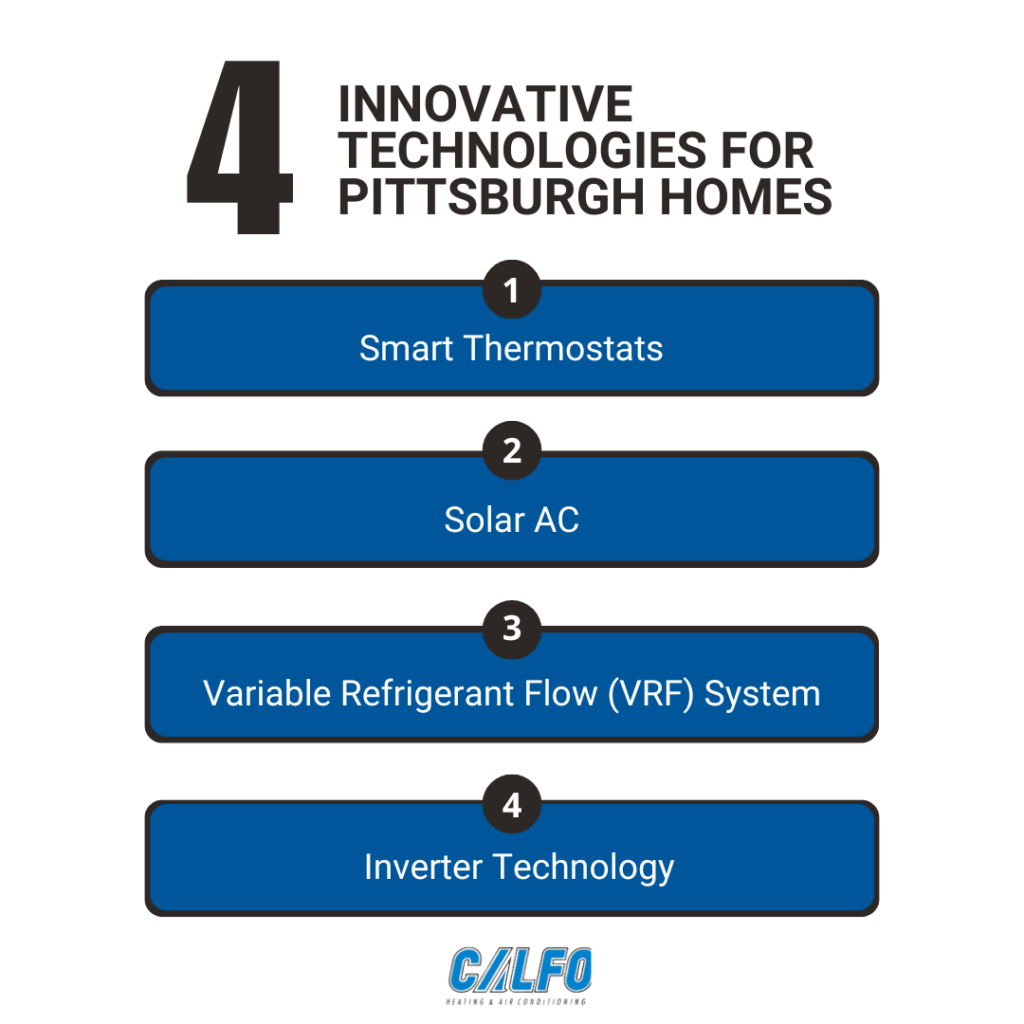
Here’s how these innovations can save money and improve comfort:
1. Smart Thermostats: With smart thermostats, Pittsburgh residents can have precise control over their AC systems from anywhere, optimizing energy usage based on occupancy and weather conditions. This can prevent leaving units running when they don’t need to be.
2. Solar Air Conditioning: Solar panels are becoming increasingly popular as homeowners experience decreased energy bills and state incentives. This energy source can greatly help lower energy bills related to cooling your home.
3. Variable Refrigerant Flow (VRF) Systems: VRF systems use smaller pipes rather than larger ducts which make them easy to install in older homes and buildings. These systems can cut down on energy waste by 30% by not using traditional ducts.
4. Inverter Technology: Inverter AC units adjust compressor speed dynamically, maintaining consistent indoor temperatures while consuming less energy compared to traditional units.
By embracing these advancements in HVAC technology, Pittsburgh residents can enjoy cost savings, enhanced comfort, and a reduced environmental impact, making their homes more sustainable for the future.
Sustainable Air Conditioning Practices in Pittsburgh
Several eco-friendly air conditioning practices are particularly relevant to the Pittsburgh area. Implementing these practices can ensure an efficient and sustainable home system.
- Choose Energy-Efficient AC Units
Upgrading to an energy-efficient air conditioning unit is one of the most effective ways to practice sustainability. Modern air conditioners with higher Seasonal Energy Efficiency Ratios (SEER) consume less energy for the same cooling output. The U.S. Department of Energy recommends units with a SEER rating of at least 15 for optimal efficiency.
- Install a Programmable Thermostat
Installing programmable or smart thermostats can lead to significant energy savings. These devices allow residents to set temperature schedules, ensuring the air conditioning is not running unnecessarily, especially when no one is home. Some smart thermostats can even learn a household’s patterns and adjust temperatures accordingly to maximize system efficiency.
- Perform Regular Maintenance and Tune-Ups
Regular maintenance of air conditioning systems is crucial. This includes cleaning or replacing filters, checking for refrigerant leaks, and ensuring the system is running at its optimal capacity. Properly maintained systems use less energy and have a longer lifespan, reducing the need for frequent replacements.
- Ensure Home Insulation and Sealing
Enhancing home insulation and sealing any leaks can significantly reduce the need for air conditioning. Proper insulation in walls, roofs, and around windows can keep the indoor environment cooler in the summer and reduce the load on air conditioning systems.
- Utilize Natural Ventilation
Whenever the weather permits, utilizing natural ventilation can be a sustainable alternative to air conditioning. Opening windows during cooler times of the day and using fans can help circulate air and maintain a comfortable indoor environment.
By incorporating these eco-friendly practices, Pittsburgh residents can enjoy an efficient and sustainable air conditioning system that benefits both their wallets and the environment.
Tips to Save on Air Conditioning Costs
Pittsburgh homeowners can employ several low-maintenance strategies to save on air conditioning energy and reduce bills:
1. Cook Outside in the Summer: Fire up the grill outside! This will reduce the heat produced by kitchen appliances while cooking.
2. Open Windows at Night and Use Fan: This method takes advantage of the cooler night air.
3. Close Windows, Blinds, and Drapes: Direct sunlight coming through windows can dramatically heat your home.
4. Take Cooler and Shorter Showers: Cooler showers can reduce the amount of humidity created in your home.
Energy Incentives for Pennsylvania Residents
Act 129 Energy Efficiency Programs & Rebates
The Pennsylvania Public Utility Commission (PUC) enforces Act 129 to aid electric utilities in using less energy during peak demand. Since its start in 2009, Act 129 has saved over 8.8 million megawatt hours of electricity, saving Pennsylvania electric customers $6.4 billion.
Federal Rebates for ENERGY STAR Products
ENERGY STAR partners with sponsors to provide tax exemptions, rebates, credits, and special offers for customers with ENERGY STAR-certified products.
Federal Tax Credits for Renewable Energy in Pittsburgh
Homeowners can save up to $3,200 annually on taxes for making energy-efficient upgrades to their homes, such as AC systems.
Identifying and Resolving Air Conditioning Issues
The Top 5 Most Common AC Problems in Pittsburgh, PA
Pittsburgh homes face a variety of HVAC issues, but Calfo Home Services often receives inquiries regarding refrigerant leaks and low levels, obstructed or soiled air filters impacting airflow, wiring, and electrical issues, malfunctioning thermostats, compressor and condenser unit complications, and inadequate maintenance resulting in diminished performance. Below are the five primary issues that Pittsburgh homeowners face with their AC units.
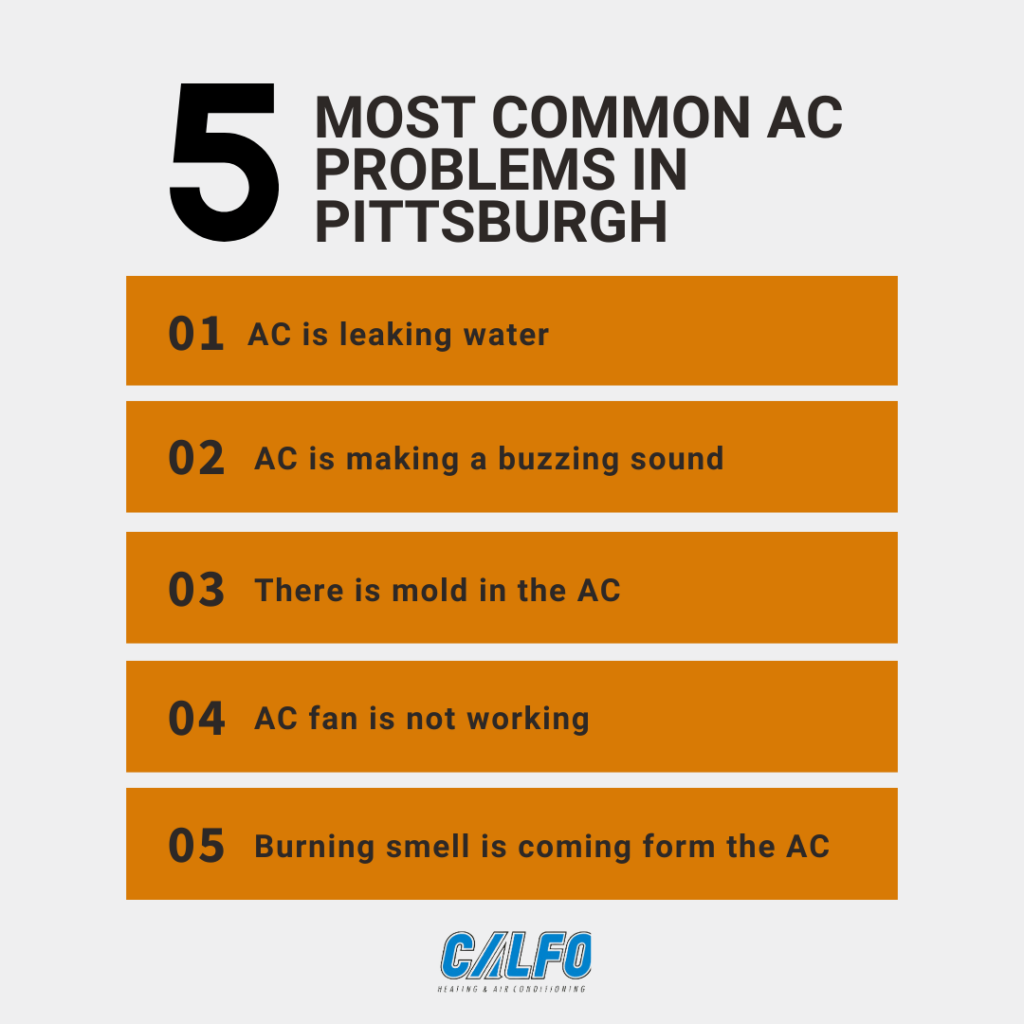
Let’s dive into these common issues:
- Air Conditioner is Leaking Water
Potential Issue: When water is leaking from an AC it often indicates a clogged drain or malfunctioning condensate pump.
Homeowner Action: Check the condensate drain line for blockages and clean it. Inspect the condensate pump for proper function.
DIY or Professional Action: This can generally be a DIY task. If cleaning the drain doesn’t resolve the issue, it’s advisable to call a professional.
- Air Conditioner is Making a Buzzing Noise
Potential Issue: A buzzing noise from an air conditioner typically signals electrical issues, such as loose wiring, a faulty compressor, or problems with the fan motor or blades.
Homeowner Action: Visually inspect for any obvious loose parts or damage. Listen to identify if the buzzing is coming from the outside unit or inside.
DIY or Professional Action: Electrical issues should be handled by professionals due to safety risks. While a homeowner can perform a basic visual check, it’s recommended to call a professional if the buzzing noise persists or if there’s any uncertainty about the source of the buzzing.
- There is Mold in My Air Conditioner
Potential Issue: Mold growth in AC units is typically due to excess moisture and inadequate maintenance.
Homeowner Action: Clean the accessible parts of the unit and replace filters regularly. Ensure proper airflow and humidity control.
DIY or Professional Action: Minor cleaning can be DIY. For extensive mold, especially in ductwork, professional cleaning is advised to ensure health and safety.
- Air Conditioner Fan is Not Working
Potential Issue: A non-functional AC fan could be due to a tripped circuit breaker, a faulty motor, or a problem with the thermostat.
Homeowner Action: Reset the circuit breaker and ensure the thermostat is set correctly. Check for any visible signs of damage.
DIY or Professional Action: Resetting the breaker or thermostat can be done DIY. However, if the issue persists, a professional assessment is recommended.
- A Burning Smell is Coming from My AC
Potential Issue: A burning smell from an AC unit can indicate an electrical issue or a burnt-out motor.
Homeowner Action: Immediately turn off the unit to prevent potential fire hazards.
DIY or Professional Action: This is a situation for a professional. Do not attempt DIY repairs as electrical issues can be dangerous.
What Are Some Common Signs My Air Conditioning Needs Repair?
In addition to obvious signs like insufficient cooling in your home, watch for unusual noises such as rattling or squealing, unpleasant odors from your vents, high humidity levels, frequent cycling on and off, and a significant increase in energy bills without any radical change in usage.
- You Have a Thermostat Issue
Your thermostat is used to automatically adjust the temperature in your house based on what the current temperature in your home is. A deficient thermostat can cause your AC system to malfunction. Check the batteries first but call a professional if it’s a wiring or technical issue.
Recommendation: DIY Fix (unless it’s a wiring or more highly technical thermostat issue)
- Your AC Is Leaking Refrigerant (Freon)
AC leaking freon or running out of it is a major issue. Leaking refrigerant reduces cooling efficiency and may cause bubbling noises. It’s harmful to the environment and needs immediate attention.
Recommendation: Call A Professional
- Your AC Has Faulty Wiring
Any air conditioner needs a power source. Frequent circuit breaker trips, short cycling, and buzzing or clicking sounds can indicate faulty wiring.
Recommendation: Call A Professional
- You Have a Clogged Drain Line
Your AC unit pulls humidity from the air and produces water. This water typically drains away in your drain lines. Over time water can get caught in the drain line and back up. Blocked drain lines due to algae, mold, or debris can cause water leakage and musty odors.
Recommendation: Call A Professional
- Your AC Contactors Are Worn Out
The contactor plays a major role in starting and stopping your AC unit by controlling the electricity to other parts of the system such as the compressor and motor. Over time, they can wear out. Worn contactors impede electrical flow, leading to failed operation and potential damage to other AC components.
Recommendation: Call A Professional
- Your AC Coils Are Dirty, Corroded, Or Frozen
The two main causes of frozen AC coils are clogged air filters/lack of air flow, and refrigerant leaks. Dirty or clogged air filters and ducts disrupt airflow, preventing the system from keeping the coils warm. This causes moisture to settle and freeze on the coils. Refrigerant leaks can lower system pressure, causing the refrigerant to expand and freeze or accumulate and freeze if not properly drained.
Recommendation: Call A Professional
When to Call a Professional for Air Conditioning Repairs in Pittsburgh
Sometimes, expert intervention and service is necessary. Discover how to identify the signs that it’s time to call in the professionals for your air conditioning repair.
Can I Wait Until Fall in Pittsburgh to Get My AC Repaired?
Calfo Home Services recommends that you schedule a call immediately. You could be wasting money on energy bills and enduring poor air quality all summer long. This discomfort can create additional stress for you and your family. Additionally, you risk shortening the lifespan of your system, with the worst-case scenario being a major system failure requiring replacement.
Handling Emergency AC Repairs in Pittsburgh
Despite preventative measures, emergencies can still occur. Calfo Home Services offers 24/7 emergency AC repair, but homeowners should also have a response plan for a failing air conditioner to avoid finding themselves camping out at a relative’s house or a hotel room on a hot summer night.
Quick Overview:
Recognize Urgency: You should have an emergency contact readily available especially if you have vulnerable individuals in your home, such as children, the elderly, or those with medical conditions. In worst-case scenarios, be prepared to pay for a hotel room. Keep an extra case of water on hand to stay hydrated; if you don’t have any, make purchasing one part of your response plan.
Have Fans Ready: Staying cool is crucial in an emergency. Have fans available, stay in your basement, and use dehumidifiers to avoid the hottest parts of the house, usually upstairs.
Invest in an Alternative Cooling System: Consider investing in a portable unit or window AC unit that can cool at least one room or one floor of your home during emergencies.
Exposing Common Air Conditioning Misconceptions
Numerous misconceptions surround AC repairs. This segment seeks to expose prevalent myths and offer accurate insights.
- “It’s just a small issue” – Don’t underestimate the complexity of AC issues. DIY fixes may overlook larger underlying problems. Attempting repairs based on online tutorials can exacerbate damage to your unit.
- “Bigger is better” – Some people believe that a larger AC unit will cool their space faster and more efficiently, but in reality, an oversized unit can lead to inefficient cooling, higher energy bills, and increased wear and tear on the system.
- “Closing vents in unused rooms saves energy” – Closing vents in unused rooms might seem like a good idea to save energy, but it disrupts the balance of airflow in your HVAC system, leading to inefficiencies and potential system damage.
- “Routine maintenance is a waste of money” – Regular maintenance programs are not financial traps; they prevent costly breakdowns, improve efficiency, and prolong the lifespan of the system. Neglecting maintenance may seem cost-effective initially, but it significantly shortens the durability of your system.
- “Turning the thermostat way down cools the room faster” – Many believe that setting the thermostat to a very low temperature will cool the room faster, but air conditioners cool at a consistent rate, regardless of the temperature setting. Overcooling only wastes energy and decreases system efficiency.
- “Refilling/checking refrigerant is essential” – Refilling refrigerant isn’t a routine task. AC units operate in a closed system, and low refrigerant levels typically indicate a leak that needs professional attention, not routine maintenance.
Warranty & Insurance for AC Repair & Installation in Pittsburgh
Understanding warranties and insurance for your air conditioning system can save you time and money by clarifying what is typically covered, what is not, and who to contact if you need assistance.
Most home warranty policies are designed to cover major home appliances and systems that are typically expensive to replace. Each insurance policy and home warranty are unique, however, there are a few things that are commonly covered:
- Major home appliances: refrigerators, stoves, garbage disposals, and washing machines.
- HVAC systems
- Ductwork
- Water heaters
- Electrical systems
- Plumbing
Knowing the specifics of your warranty and insurance policies can help ensure you’re prepared for any issues with your central AC unit and other essential home systems.
Do Pittsburgh Homeowners Need Air Conditioners?
Yes! While Pittsburgh, PA may not seem to get hot weather compared to southern states, anyone who’s experienced more than one summer in the area knows the region can get very hot and humid. A few reasons Pittsburgh residents need air conditioners:
- Hot and humid summers: Pittsburgh summers average around 80°F but can reach uncomfortably higher temperatures. In addition to hot temperatures, the Southwestern Pennsylvania region also experiences high humidity levels.
- Preserving your household and belongings: The high temperatures and humidity levels of the area can cause damage to a home’s wood fixtures, drywall, furniture, and electronics.
- Indoor Air Quality: In addition to cooling air, air conditioners also filter air to remove pollution, allergens, and other particles. Pittsburgh is known for its poor air quality as an industrial city, making this factor especially important for city residents.
Though air conditioning may not be needed year-round in the Pittsburgh area, the benefits that air conditioning provides homes and families during the months are paramount to keeping residents comfortable.
Legal Regulations and Indoor Air Quality Standards in Pittsburgh
Indoor air quality (IAQ) is a major concern for the City of Pittsburgh and the surrounding area. IAQ is critical to having a healthy household. A few local IAQ regulations in Pittsburgh are:
- Building Codes: The City of Pittsburgh follows both state and local codes for HVAC systems, ventilation, and air filtration of residential and commercial buildings.
- Energy Codes: The Pennsylvania Uniform Construction Code (UCC) sets standards for the operation of air conditioning systems to ensure they operate effectively while minimizing energy consumption.
- Public Health Recommendations: Pittsburgh monitors and complies with IAQ standards set by the U.S. Environmental Protection Agency, the Pennsylvania Department of Environmental Protection, and the Allegheny County Health Department.
Understanding Air Conditioning Installation and Repair Costs in Pittsburgh
There are several contributing factors to the costs associated with installing, maintaining, and repairing air conditioning units.
Several factors can impact the cost of air conditioning installation and repairs. Here are some key considerations:
Installation Costs for Air Conditioning Units
There are a few things to take into account when thinking about the costs of air conditioning installation costs:
1. Type and Size of Unit: The type of AC unit and its size will make a significant difference in installation costs. The larger and more complex the unit, the higher the installation cost.
2. Energy Efficiency: The more efficient a unit is, is usually correlated with how much the unit costs. More efficient units can be more expensive initially but offer cost savings over time due to reduced energy consumption.
3. System Complexity: Systems with multiple zones (rooms) can require more advanced control systems that may require a more in-depth installation, leading to higher costs.
4. Accessibility and Location: How easily the area where the unit will be installed is to access is a factor to consider. If the area is difficult to access or requires special construction features, this can lead to higher installation costs.
5. Existing Infrastructure: The condition of your home’s ductwork, wiring, and other elements associated with the unit can affect installation costs If these elements need to be upgraded or modified, this may increase the cost.
Repair Costs Associated with Air Conditioning Units
The costs associated with repairing an air conditioning unit vary based on a few factors:
1. Type of Repair: The level of complexity, along with the cost of parts can greatly impact the cost of a repair. Basic repairs/maintenance, such as replacing a filter or topping off refrigerant, are relatively inexpensive. Major repairs, such as compressor replacements or coil repairs, can be slightly more costly.
2. Age and Condition: As a unit gets older, the more likely it is that it will need a repair, along with how well it has been maintained throughout its life.
3. Type of Unit: Each type of AC unit is very different from the next, meaning so are their repaid costs.
4. Preventive Maintenance: Regular maintenance of the unit can help to prevent costly repairs and lengthen the life of the unit.
Types of Air Conditioning Units for Pittsburgh Homeowners
There are a few common types of air conditioners that are most used by Pittsburgh residents.
Central Air Conditioning Systems for your Pittsburgh Home
These systems work to cool an entire home using a network of ducts installed. The main unit is located outdoors and includes a compressor, condenser coil, and evaporator coil. Central AC systems work well to maintain consistent temperatures for large homes but require higher upfront costs of installation of both the system and ductwork (if it is not already existing in the home).
Installation Process of Central Air Conditioning Systems
Once the Calfo team has assessed your home to determine the correct system size and you’ve approved our quote, our team will get to work!
If your home already has ductwork, it will be inspected to ensure it can work with your new central AC system. If your home doesn’t have existing ductwork, or if the ductwork needs replacing, that will be the first step: install new ductwork.
Next, the outdoor unit consisting of the condenser and compressor will be installed on a concrete pad.
Once the work outside is complete, the team will begin to install the indoor unit, which is an evaporator coil. This element will be installed in a central location such as an attic or basement and connected to the furnace or air handler.
Next, the indoor and outdoor elements are connected with refrigerant lines and electrical wiring. A drain line is installed to remove condensation from the evaporator coil.
Once all of the main elements of the central AC system are installed, the thermostat will be installed, and the unit will be tested to ensure it works perfectly for your Pittsburgh home!
Costs Associated with Central Air Conditioning
There are several costs associated with central AC units.
- Unit Cost: The cost of a central AC unit depends on a few things, including the efficiency rating and the size, which is measured in BTUs.
- Installation Cost: This cost is dependent on whether the home needs ductwork and the complexity of the installation.
The Efficiency of Central Air Conditioning Units
A few factors that contribute to the efficiency of central AC units include:
- SEER Rating: This is the Seasonal Energy Efficiency Ratio. The higher the rating, the greater the efficiency. The ratings range from 13 to 25.
- Energy Consumption: These units are designed to cool large spaces. If the unit is properly sized for your home, it can provide energy savings.
- Regular Maintenance: Maintaining your unit properly will help ensure that it is running properly and as efficiently as possible.
- Duct Sealing & Insulation: Properly sealed and insulated ductwork and prevent energy loss.
Ductless Mini-Split Systems for Your Pittsburgh Home
A ductless mini-split air conditioning system has two main components:
- Outdoor unit: compressor and condenser
- Indoor unit: evaporator coils and air handlers
These systems do not require ductwork, and each indoor unit can be individually controlled.
Installation Process of Ductless Mini-Splits
Our team will assess your home to determine the correct size and number of indoor units needed and provide you with a quote. Once our quote has been accepted, we will install the outdoor unit on a concrete pad or mount it on an exterior wall.
Next, the indoor units are mounted on walls or ceilings in the desired locations. These units are then connected to the outdoor unit using refrigerant lines and electrical wiring.
Finally, the system is tested to ensure they are cooling your home correctly.
Costs Associated with Ductless Mini-Split Systems:
There are a few factors that contribute to the costs associated with ductless mini-split systems:
- Unit Cost: The unit cost will depend on how many indoor units are needed and the size.
- Installation Costs: Installation costs are also dependent on the number of units.
Efficiency of Ductless Mini-Splits
- SEER Rating: This is the Seasonal Energy Efficiency Ratio. The higher the rating, the greater the efficiency. The ratings range from 13 to 25. Most ductless systems have high SEER ratings (18-25), making them very energy efficient.
- Zoned Cooling: Ductless mini-split systems offer zoned cooling, meaning you can control the temperature in individual rooms separately. This can lead to significant energy savings by only cooling rooms as they are in use.
- Inverter Technology: Many ductless mini splits use inverter technology, which adjusts the compressor speed to maintain the desired temperature efficiently, reducing energy consumption and lessening wear and tear on the system.
- Energy Savings: Without ductwork, there is no energy loss due to duct leaks, which the U.S. Department of Energy estimates can account for up to 30% of energy consumption in ducted systems.
Air Conditioning Systems for Renters
If your rental doesn’t have a central AC or ductless mini-split unit already, there are a few options to keep you cool.
- Window Air Conditioners
These units are the most affordable, and easiest to install. However, these units are designed for small spaces or single rooms.
- Portable Air Conditioners
These units are freestanding and can be moved from room to room to cool small spaces, offering easy installation and flexibility.

